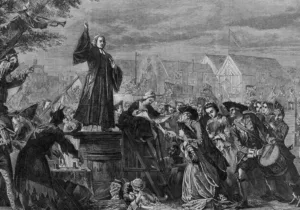American Christian nationalism is, critics would have us believe, a very scary thing. According to one its most prominent investigators: “Christian nationalism is an existential threat to American democracy and the Christian church in the United States.” Democratic strategist James Carville recently claimed it was a bigger threat to the United States than Al Queda. In the spring, a documentary will be released purportedly demonstrating that, in the words of executive producer Rob Reiner: “Christian Nationalism is not only a danger to our Country, it’s a danger to Christianity itself.” (It is touching that Reiner, who at least in the past rejected organized religion, seems concerned that Christianity is in danger. I have it on good authority that it’s not.)
I would be scared, perhaps even terrified, if I agreed with Andrew Whitehead and Samuel Perry that 51.9% of Americans fully or partially embraced the toxic stew they call Christian nationalism. But, as I have argued elsewhere, they mostly measure whether someone is an advocate for the strict separation of church and state. One can believe, for instance, that a World War I era cross on public land needn’t be torn down and that voluntary student prayer should be allowed in public schools without being a Christian nationalist in any meaningful sense.
If Whitehead and Perry exaggerate the percentage of Americans who are Christian nationalists, Pew’s October 2022 study, which found that only 5% of Americans have a favorable view of Christian nationalism, almost certainly understates the problem. Fortunately, recent studies paint a far more reasonable picture of what’s going on with American Christianity.
One of these studies was commissioned by Neighborly Faith, an organization committed to promoting civil discourse—especially between Americans of different faiths. Believing that civil discourse is not served by exaggerating the threat of Christian nationalism, the organization commissioned a rigorous, scientific, and reasonable survey about it. The organizers invited me to help craft the statements used to measure the extent to which one is a Christian nationalist.
I’m not a number crunching political scientist, but I jumped at the opportunity. I have long thought the earlier statements, especially those used by Whitehead and Perry, were problematic as only one of them clearly involved favoring Christianity above other faiths. I strongly encouraged Neighborly Faith’s social scientists to include more statements that did so, and they agreed. The new, recently released study measures the extent one is a Christian nationalist by asking those taking the survey to respond to 14 statements (rather than 6 or 7) with a “strongly agree,” “somewhat agree,” and so forth. Among the new statements are:
1. The true culture of the United States is fundamentally Christian.
2. The federal government should advocate uniquely Christian values.
3. Christian symbols, like the cross, the Bible, or the Ten Commandments, should be the only religious symbols allowed in government buildings. [Yes, I know the Ten Commandments aren’t just a Christian symbol; I didn’t get everything I wanted.]
4. Public schools should allow teachers/coaches to lead or encourage students in Christian prayer.
Using responses to all fourteen statements, the social scientists running the survey developed a spectrum that measures one’s relationship with Christian nationalism that includes: Adherents (11%), Sympathizers (19%), Christian Spectators (18%), Undecideds (16%), Pluralistic Believers (19%), and Zealous Separationists (17%). If the Adherents and Sympathizers are combined, they constitute 30% of the population, a far cry from Whitehead and Perry’s 51.9% and one more in line with other studies and my own calculations.
Because of space constraints, I’ll focus on the extremes: Adherents and Zealous Separationists. The 11% of Americans who classified as Adherents “strongly couple Christianity and government,” are “most likely to identify Jewish, Black, and LGBTQ Americans as having ‘too much’ influence,” and are “most likely to endorse dehumanizing language about their political opponents.” Roughly 17% of Americans are Zealous Separationists who “strongly oppose the comingling of church and state,” are “the least favorable toward religious groups,” and are “generally irreligious and politically liberal.”
Outspoken advocates of both groups do great harm to civil discourse in America. Adherents contending that Christianity should be formally favored by local, state, and national governments both offend and perhaps even scare the 37% of Americans who do not identify as Christians (and many Christians, including me, oppose such favoritism). On the other hand, separationist opposition to a World War One era cross on public land or the inclusion of a Star of David in Ohio’s Holocaust and Liberators Memorial is troubling to many Americans who don’t think fairness requires the public square to be religion free.
But perhaps focusing on the extremes is misleading. It is the case, after all, that roughly 72% of Americans seem open to privileging neither Christianity nor secularism. This suggests that pluralism is the solution, e.g., we needn’t choose between extremes having teachers led students in Christian prayers and teachers prohibiting students from praying. We can simply allow students in public schools to voluntarily pray, or not, as they desire.
Similarly, there is no need to tear down a 1925 cross now on public land in Bladensburg, Maryland. But if the county were to erect a new monument to honor soldiers who died in Afghanistan, pluralism suggests it should erect one that is religiously neutral or one that contains images and/or language from different religious traditions.
A few high-profile social media incidents have suggested that Adherents are antisemitic, but Neighborly Faith’s study has some good news in this regard. Of course, any antisemitism is troubling, and this study found that 9% of Adherents have unfavorable views toward Jews, which matches the general population. But Adherents are far more likely to have favorable views of Jews that the general population (56% v. 38%). (Far more worrisome in this regard are students, professors, and even some presidents at Ivy League schools.)
Similarly, 10% of Adherents have negative views of African Americans, as opposed to 9% of the general public. But 57% of them have positive views, as opposed to 47% of the general public. This result may be partially explained by the fact that the study doesn’t separate white and black Adherents, but still, it is encouraging.
One can only hope that studies such as Neighborly Faith’s can help dial back the heated dialogue about American Christian nationalism. Yes, it is problematic, and Christian leaders should address its dangers. But there is no good reason to believe that the phenomenon will lead to the destruction of America’s constitutional order or the Christian Church.






 Sponsor a student for Christianity & National Security 2024
Sponsor a student for Christianity & National Security 2024